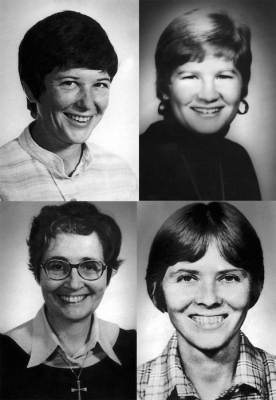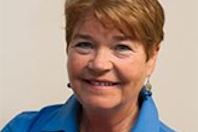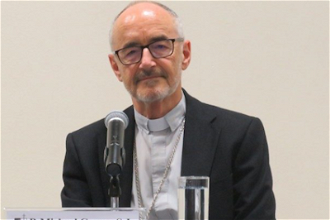Remembering Maura, Ita, Dorothy and Jean

Ita Ford, Maura Clarke; Sister Dorothy Kazel, Jean Donovan
In the UK, the fortieth anniversary of the martyrdom in El Salvador of four Catholic missionaries from the United States is to be marked in an online service in a London Catholic parish. Washington-based couple Scott Wright, who works for the Columbans, and Jean Stokan, who works for the Sisters of Mercy, remember their witness.
The date, 2 December, will mark the 40th anniversary of the martyrdom of four US church women who were assassinated in El Salvador that day in 1980. Maura Clarke, Ita Ford, Dorothy Kazel, and Jean Donovan: two Maryknoll sisters, one Ursuline nun, and a young lay person.
Today, 40 years later, we live in a very different world, where the cry of the Earth and the cry of the poor are joined together. Nations have been planning for action on the climate crisis, which is creating extreme weather events, severe droughts and flooding, rising sea levels and melting glaciers, and disrupting food security.
Today, 40 years later, 12 million Syrians - half the population of their country - are displaced from their homes, with 5.6 million fled to distant lands and as far as Europe, seeking refuge. They risk their lives on sea and on land and have been greeted with both generosity and with hatred. The same fears and threats hurled at European Jewish refugees seeking to escape Nazi extermination 75 years ago is being hurled at Syrian Muslim refugees today, in both Europe and the U.S.
The challenges we face today are different from the challenges we faced 40 years ago when the four church women died. They call for new perspectives and new structures, new vision and new social movements to adequately respond to the need for justice for present and future generations.
Still, the witness of the four church women continues to speak to us today. For us who remember them, and remember that day, it has been a long journey, walking with the poor of Central America and Mexico on new paths yet to be forged. The passage from John's Gospel comes to mind: "Unless a seed fall to earth and die, it will bear no fruit; but if it die, how great the fruit!"
Throughout these years, we have kept the memory of the martyrs alive, and have asked: What do they require of us today? We think especially of Archbishop Oscar Romero, martyred on 24 March 1980, and the Jesuit martyrs of the University of Central America, along with Celina and Elba, martyred on 16 November 1989. We think of Rufina Amaya, the sole survivor of the El Mozote massacre that killed a thousand people, and of Maria Julia Hernandez, who refused to let the world forget what happened there. We remember so many who generously gave of their lives during 12 years of war in El Salvador, and in the years after.
But on 2 December we remember in a special way the four church women, and ask, "What would they be doing today, if they were living in our times?" And what ought we to be doing?
What insights do their courage give us into how we ought to respond today to a myriad of challenges: the migrants dying on the migrant trail and in the Arizona desert; the growing divide between rich and poor; global warming and climate catastrophes; the violence and racism in our inner-cities and prisons.
It has been 40 years since the four church women were killed. Then they served the poorest of the poor, families and children displaced by death squad and military violence, refugees fleeing the countryside to refugee camps set up by Archbishop Romero in the churches and seminaries of his archdiocese.
We don't have to look far to know how they might respond today. Because they chose to live in the midst of war and cried out for an end to violence; they saw the victims of torture and cried out for an end to torture; they offered food, shelter and medicines to the families displaced by the war and offered refuge, risking their own lives; they took sides with the poor and cried out for justice. In life and in death, they shared the same fate as the poor. They were prophets of a future not their own. They were seeds that fell to earth and died.
To what do they call us today?
Today, if they were living, we are certain that they would be found advocating on behalf of refugees and opening our borders to victims of wars we have waged in the Middle East and Afghanistan.
They would be there with the young people of El Salvador and Honduras, Guatemala and Mexico, fleeing the gang violence in their neighbourhoods - a violence that is fast approaching the levels of violence not seen since the years of the war in El Salvador, almost a thousand people a month. They would be at the U.S-Mexico border offering hospitality to those unaccompanied minors and mothers risking their lives only to be detained and deported, or often to die in the Arizona desert. They would be protesting in front of immigration detention centers and calling for a more just and humane immigration policy, welcoming the stranger in our midst. And they would be in the streets questioning the violence of pouring more dollars and more weapons to build up our military and wage more wars, just as we did in El Salvador 40 years ago.
They would be in the streets calling for an end to war - wars based on lies and deception, like the war in Iraq - and to the abominable practice of torture overseas and in prisons closer to home where tens of thousands languish months and sometimes years in solitary confinement.
We remember the martyrs, and the crucified peoples, and never let us forget our responsibility to challenge a world that institutionalises violence and greed. Our hearts go out to the peoples of El Salvador and Honduras, Guatemala and Mexico, as they struggle with basic issues of survival and rebuilding of their lives after so many disasters: hurricanes and earthquakes, but also violence and poverty. We pray for an outpouring of compassion and solidarity, that we may continue to address in systemic ways the underlying human failings - structural poverty, racism, violation of human rights, destruction of the environment - that these and other natural and human disasters unmask with such brutal clarity.
We remember these years with a mixture of emotions - sadness as well as gratitude - but mostly gratitude. We think of Archbishop Romero's words about the resilience of the poor, when he spoke about the capacity of the Salvadoran people to overcome suffering - and bear witness to hope. Let us continue to encourage a spirit of solidarity with the victims of natural and human disasters - wherever they occur - and help create conditions of dignity and hope for the future.
May the witness of the four church women and the love they have sown over 40 years be like a scattering of seeds, bearing fruit along the way as we continue the journey together. We ask as well for your prayers, for our daughter to whom we gave the name "Maura," - to remember in a special way the witness of Maura and the other church women and the Salvadoran people they served - and for all of our families and children.
We honour and celebrate the solidarity of these 40 years by ending on a note of hope. Like that seed that falls to earth and dies, may we also become a scattering of seeds. May each of our humble attempts to bring a greater measure of justice and peace into this world, to speak truth to power and raise up the oppressed, be like the seed that falls to earth and dies - in order to bear fruit!
The British service will be live-streamed at 7pm on Wednesday 2 December from the Church of the Immaculate Heart of Mary, Hayes, London. Organised by the Conference of Religious of England and Wales, it is supported by CAFOD, Pax Christi, and the Archbishop Romero Trust. It will led by Fr Paul Smyth CMF Sr Anne Griffin SSHJM and Pat Gaffney, and will include a reflection by Sr Gemma Simmonds CJ.
LINKS
Parish of the Immaculate Heart of Mary - www.botwell.org.uk./
Romero Trust - www.romerotrust.org.uk/news/fortieth-anniversary-four-us-women


















